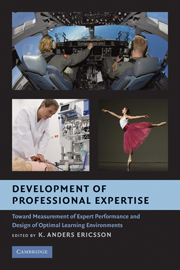 Development of Professional Expertise
Development of Professional Expertise Book contents
- Frontmatter
- Contents
- List of Figures
- List of Tables
- List of Contributors
- 1 The Measurement and Development of Professional Performance: An Introduction to the Topic and a Background to the Design and Origin of This Book
- SECTION 1 CHALLENGES IN PAST AND CONTEMPORARY EFFORTS TO MEASURE AND TRAIN THE OBJECTIVE PERFORMANCE OF PROFESSIONALS
- SECTION 2 PAST AND CONTEMPORARY EFFORTS TO DESIGN INSTRUCTION, TRAIN, AND MAINTAIN PROFESSIONAL PERFORMANCE
- SECTION 3 THE ASSESSMENT AND TRAINING OF SKILLED AND EXPERT PERFORMERS IN THE MILITARY
- SECTION 4 THE DEVELOPMENT OF EXPERTISE AND EXPERT PERFORMANCE
- 15 The Influence of Learning Research on the Design and Use of Assessment
- 16 Acquiring Conceptual Expertise from Modeling: The Case of Elementary Physics
- 17 Teaching for Expertise: Problem-Based Methods in Medicine and Other Professional Domains
- 18 Enhancing the Development of Professional Performance: Implications from the Study of Deliberate Practice
- 19 It Takes Expertise to Make Expertise: Some Thoughts About Why and How and Reflections on the Themes in Chapters 15–18
- 20 The Value of Expertise and Expert Performance: A Review of Evidence from the Military
- 21 Expertise in the Management of People: A New Frontier for Research on Expert Performance
- Name Index
- Subject Index
- References
21 - Expertise in the Management of People: A New Frontier for Research on Expert Performance
Published online by Cambridge University Press: 04 August 2010
- Frontmatter
- Contents
- List of Figures
- List of Tables
- List of Contributors
- 1 The Measurement and Development of Professional Performance: An Introduction to the Topic and a Background to the Design and Origin of This Book
- SECTION 1 CHALLENGES IN PAST AND CONTEMPORARY EFFORTS TO MEASURE AND TRAIN THE OBJECTIVE PERFORMANCE OF PROFESSIONALS
- SECTION 2 PAST AND CONTEMPORARY EFFORTS TO DESIGN INSTRUCTION, TRAIN, AND MAINTAIN PROFESSIONAL PERFORMANCE
- SECTION 3 THE ASSESSMENT AND TRAINING OF SKILLED AND EXPERT PERFORMERS IN THE MILITARY
- SECTION 4 THE DEVELOPMENT OF EXPERTISE AND EXPERT PERFORMANCE
- 15 The Influence of Learning Research on the Design and Use of Assessment
- 16 Acquiring Conceptual Expertise from Modeling: The Case of Elementary Physics
- 17 Teaching for Expertise: Problem-Based Methods in Medicine and Other Professional Domains
- 18 Enhancing the Development of Professional Performance: Implications from the Study of Deliberate Practice
- 19 It Takes Expertise to Make Expertise: Some Thoughts About Why and How and Reflections on the Themes in Chapters 15–18
- 20 The Value of Expertise and Expert Performance: A Review of Evidence from the Military
- 21 Expertise in the Management of People: A New Frontier for Research on Expert Performance
- Name Index
- Subject Index
- References
Summary
Charged with the assignment of reflecting on the conference and volume as a whole, and following the contributions of so many other distinguished discussants, I have chosen to step back for a broader perspective and comment on what is not well represented in this volume or in the research from which it draws: expertise in the management of people. Expertise of this type is critical to the military services and to civilian society, in contexts ranging from school classrooms to large commercial organizations. Most studies of expertise focus on some form of technical expertise in an individual. It is rare to study expertise that involves a complex social context and interaction with many other people. In this volume several chapters discuss experts leading their teams, while commanding a military combat unit (Shadrick & Lussier, Chapter 13), conducting surgery (Ericsson, Chapter 18), or teaching introductory physics (VanLehn & van de Sande, Chapter 16). Only the chapter by Mumford, Friedrich, Caughron, and Antes (Chapter 4), focuses directly upon these issues. The reason that the conference and the associated book emphasized individual expert performance is that this is the type of superior objective performance that has been confirmed. Mumford et al.(Chapter 4) report that studies with demonstrations of leaders' influence on their teams' objective performance, such as productivity, are very rare and have conflicting results. The current research base on expertise in the management of people is minimal.
- Type
- Chapter
- Information
- Development of Professional ExpertiseToward Measurement of Expert Performance and Design of Optimal Learning Environments, pp. 470 - 494Publisher: Cambridge University PressPrint publication year: 2009
References
- 1
- Cited by
